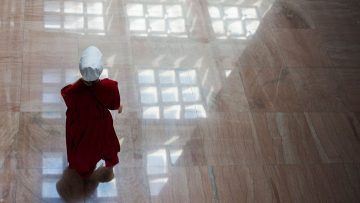Cathy Young in The Atlantic:

Woven through The Testaments—the new novel by the eminent Canadian author Margaret Atwood and a sequel to her 1985 classic, The Handmaid’s Tale—are harrowing flashbacks in which women deemed undesirable by the new men in charge are herded into a football stadium, held in brutal and degrading captivity, and periodically gunned down in the arena. These powerful, sickening scenes evoke both radical Islamist regimes and South American juntas. But they take place in a dystopian version of the United States; the makeshift prison is Harvard’s football stadium. To legions of Atwood’s American fans, this nightmarish vision is terrifyingly real. Yet the fantasy of martyrdom that Atwood taps into is self-indulgent and ultimately self-defeating—raising the question of why so many fans are so eager to believe the worst.
…At the heart of the Handmaid phenomenon is the belief—endorsed by the stars and producers of the TV series, and by Atwood herself—that Gilead is not mere fiction, but is almost upon us in real life. These parallels were endlessly hyped when the Hulu series, conceived and filmed before the 2016 election, premiered in April 2017, several months after Donald Trump’s inauguration. At the time, it was hailed in major publications as “timely,” “prescient,” and “alarmingly close to home,” despite bearing no resemblance to the actual alarming things happening under the Trump presidency. Notably, Atwood’s 1985 novel itself was partly inspired by the rise of the Christian right in the United States in the 1980s. And, for all its qualities—keen insights into the realities of totalitarianism, nuanced character dynamics, a sympathetic everywoman heroine struggling to survive under horrific oppression—it fails utterly if taken seriously as a potential scenario for America’s slide into religious dictatorship.
More here.
